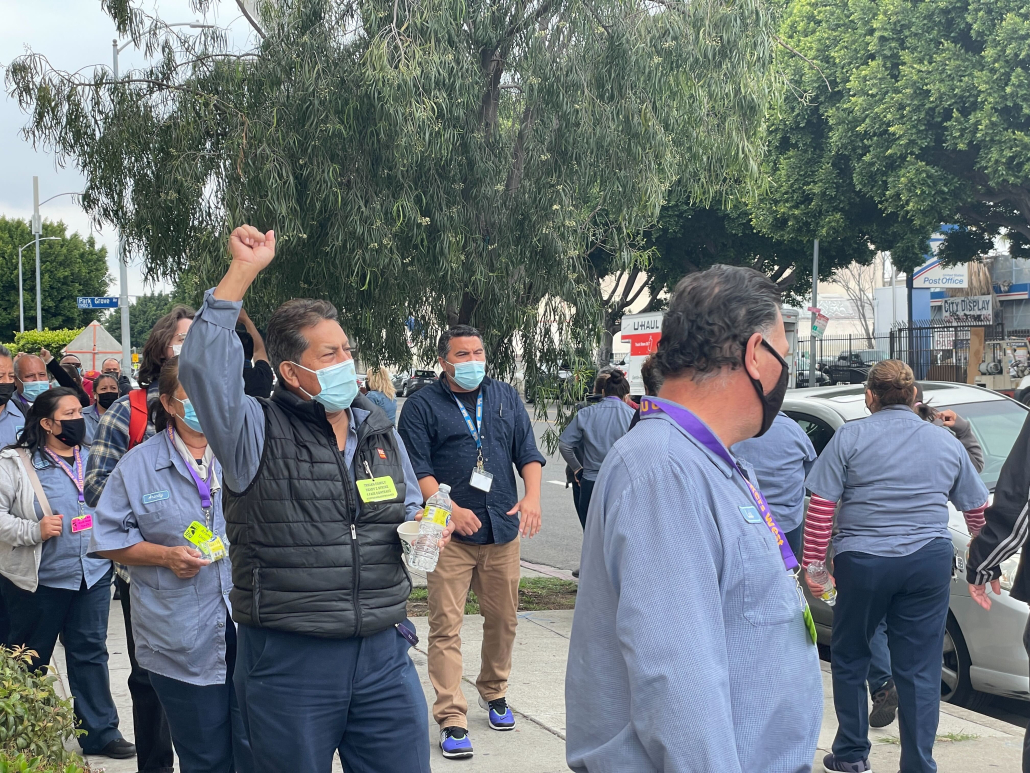University janitors continue protests at Union Hall

“Aramark, listen. We are in the fight,” custodial staff and supporters chanted in Spanish outside Union Hall Thursday afternoon. Messages clipped to their chest, some read “Aramark Unlivable Wages,” others said, “Janitors are worth more than 3%.” Passing cars honked in support and megaphones blared, chanting “Justice for Janitors!”
The struggle for fair wages for the USC custodial staff continued today as the janitors gathered in front of Union Hall on Washington Boulevard to support the negotiations between the custodial staff and Aramark. Thursday was the last day of the contract extension.
Rosa Franco, a janitor participating in the protests, said she hopes the negotiations will lead to a contract with more benefits, or at least higher salaries. For Franco and many others, more benefits mean the ability to survive.
“It’s not fair, you can’t survive with 30 to 35 thousand a year to pay mortgage bills, gas right now is so expensive,” Franco said. “We can’t survive with five cents.”
Juan Carlos Venejes, the lead organizer of the janitorial division and organizer of the contract, said the workers came to Union Hall to “put some pressure” on their employers and “let their voices be heard.” The most important issue for the workers is a living wage.
“We want to work towards having wages for people to be able to cover basic costs: be able to put a roof over their heads, provide for their families,” Venejes said. “At the current wages, we don’t believe that. It’s not possible for people to work at these wages and live a dignified life.”
One student attendee, Vianca Ruiz, a freshman majoring in business, decided to show her support after seeing the custodial staff marching over a week ago. Once she heard that the protestors were mainly Latinx, as a Latina herself, she was bothered and wanted to find out more. A representative at the march said that the movement needed more student support. After hearing that, she said she felt it was important for her to come to the protest. Ruiz said students “have a duty” to help if they can.
“If they’re put at an institution like USC, then you’re more than able to help and at least say something,” Ruiz said. “I’m not putting in any financial or anything other than just my time and my presence and I feel like that can be met by each and every student Hispanic or not.”
David Mendoza, a member of the custodial service, said he appreciates the help that USC students have given them, especially during the protest Wednesday. Thursday, however, was about fighting for a “good contract.”
“Especially for the insurance for the medication,” Mendoza said. “We fight for better benefits for insurance.”
In a statement to the Daily Trojan, Chris Collom, associate vice president of corporate communications at Aramark, wrote that they “will continue to meet with the union in an effort to reach a new contract.”
“We respect the right of our employees to demonstrate and look forward to continuing to bargain in good faith to reach an agreement that works for everyone,” Collom wrote.
Michael Sullivan, a sophomore majoring in screenwriting who also attended the event, thinks students should support the workers by signing the petition, help hold the university accountable and make sure the custodial staff’s work does not go unnoticed.
“These good people are trying to do that job and they do a great job, the campus always looks shiny and clean,” Sullivan said. “The fact they aren’t getting the wages they deserve for all the hard work they do is really messed up.”
After chanting outside Union Hall, the supporters moved inside while waiting for the initial contract from Aramark. According to Venejes, he expects that Aramark will come to the table with an offer “meets our expectation of what we feel is a living wage.”
Venejes said that students can help support the workers by spreading the word about their importance on campus.
“When you go into your classrooms or different areas of the campus, you guys appreciate that they’re clean,” Venejes said. “That’s what they do, every morning or in the middle of the night, they’re fixing the tables, fixing the chairs, cleaning the blackboards and the whiteboards, whatever the case may be.”

